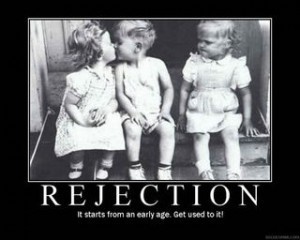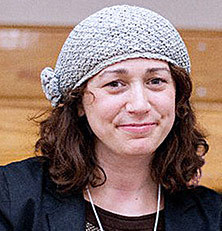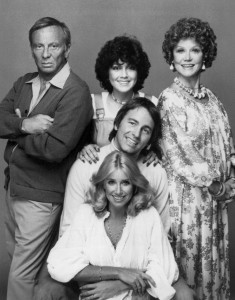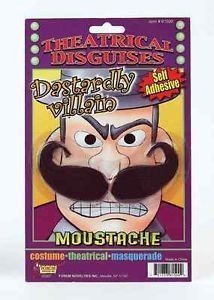Ginger Rue's Blog, page 5
February 8, 2015
Getting to Know Villains
Today I’m blogging about creating complex villains because as a professional writer, I am an expert on the subject. Ha! Quite the opposite. I chose this topic because it’s super hard and I’m trying to learn more about it myself. I’ll make a deal with you: I’ll share with you what I’ve picked up, and maybe you can offer me some tips, too. Yay, teamwork!
I blogged once about how writers can be horrible friends because we may use aspects of people we know when developing our characters, and those characters may not always be the most wonderful people. In that post, I shared how I’d modeled a villain after someone I admired because I was attempting to give the villain some depth and charisma. Well, guess what? I decided the plot wasn’t working, so I made that villain (let’s call him Character A) a good guy and then took another character (let’s call him Character B, who started out as a REALLY good guy) and made HIM the villain. I almost feel guilty about it because I liked Character B so much. When I created Character B, I wanted him to be really cool and really sweet, so I loosely based his personality on someone from my high school and college days who was—you guessed it—really cool and sweet. I gave Character B charming quirks based on this real-life person, made him the most likeable character EVER, and then decided the plot worked better if Character B were only pretending to be cool and sweet. My plot now ROCKS. Why? Because Dang! Who saw that coming?! (Originally, not even I did, and I wrote it!)
Point is, a stock character with a handlebar mustache does not a complex villain make. (Although now that I type “handlebar mustache,” I suddenly want to create a teen character who has one because that’s kind of so weird I’m intrigued. Hmmm….)
Unfortunately, it seems that the only way to create a compelling villain is to walk around inside his/her head for a while. Get to know him/her. Find the intrigue among the evil. Not fun. If you knew a villainous person in real life, you’d want to avoid him, but as a writer, you have to know him well and find out what makes him tick.
If you know of a better way to create a complex villain, please share. I’d like to spend as little time with evil people as possible—real or fictional.
January 19, 2015
What Kind of Name is Regina George?

fanpop.com
I was thinking about doing a blog post on naming characters, and in said post, I was going to discuss how important it is to choose suitable character names that don’t date the writer. Like, for example, if you’re writing a contemporary teen fiction, you probably don’t want to have characters named Debbie, Cindy, or Judy, because when is the last time you met a girl in this generation with one of those names? They’ve just fallen out of fashion. I started teaching in the early 90s, and of all the students I’ve ever taught (and as Billy Collins pointed out in one of his poems I love, there have been enough to populate a small town), I don’t recall ever teaching a Debbie, Cindy, or Judy. (Lots of Madisons, Taylors, Jordans, and Morgans, though.)
But when I started thinking of this blog post, it occurred to me that one of the most successful teen girl movies ever has an anachronistic main character name: Regina George in Mean Girls. Regina? Really? Does she hang around with Deloris and Betty? Teen girls today just aren’t typically Reginas. So why Regina when that name is so dated?
I looked it up. Tina Fey chose that name because Regina means “queen” in Romanian, Italian, and Latin.
Of course it does. And this is but one reason why Tina Fey is Tina Fey and I’m not.
But for those of you out there who, like me, are not Tina Fey, you might want to think about some good sources for character names. A current school yearbook (not yours from the 80s where everyone was Michelle or Stacy, mind you) or a teen magazine with letters from readers can both be good sources of contemporary names.
I also sometimes like to use names of people I know in my books. My villain in Brand-New Emily is named after a former colleague of mine because hey, her name is Heatherly, and even though the real Heatherly is really nice, what kind of writer would I be if I let a perfect name like that go to waste? It just screams POPULAR GIRL. My main character in Jump is Brinkley. I don’t know a Brinkley in real life, but someone had told me there was a Brinkley in my hometown and suggested it as a character name. I liked it, so I used it. (A couple of weeks ago, I met a nurse who’d named her daughter after the very same Brinkley, so the real, original Brinkley now has two namesakes at least.) The main character in my upcoming novel is named for a British doctor I’ve never met but who married the brother of a close friend of mine from high school about twenty years ago. When my friend told me her soon-to-be-sister-in-law’s name, I thought it was so cool that I knew I’d have to steal it some day, and I finally have.
Yes, I think it’s perfectly fine to steal names. As TS Eliot is rumored to have said (he didn’t exactly, but I still like the quote), good poets borrow and great poets steal. I think that somehow gives fiction writers a pass to nab a good name. And if your friends are cool, they won’t mind and might even like it. Heatherly, for one, thinks it’s a hoot to have a fictional diva share her name. I’m so glad, because I just don’t think a Judy could’ve possibly wielded the same power as a Heatherly.
January 6, 2015
To Be or Not to Be…Groovy?
I love young people. I love how their future stretches out before them, waiting for choices to be made and adventures to be had. I love their fresh way of looking at the world. I love how, whether they are conscious of it or not, they’re trying on new personas like clothes, trying to find the right fit, until something suits them and just works. And I love how their language parallels all of this–how their use of words evolves and grows and adapts in a ceaseless process of fitting into the fluidity of their lives.
As writers for a young audience, dare we try to keep pace?
If you’re writing for teens, I would highly recommend that you spend some time hanging around them. (Notice I didn’t say “hanging around WITH them.” There’s a difference. If I have to explain it to you, you might want to forget the whole thing because there’s a good chance they already think you’re dorky, creepy, or both.) You want to observe their speech patterns, but should you necessarily try to mimic them in your work?
I’d vote no.
Because here’s the thing: by the time you get something published, chances are good that the cutting-edge teen slang you mimicked is going to be so last year.
I use a lot of teen slang in my interactions with fellow adults. Why? Because I think it’s hilarious. I do it self-consciously, for effect. The other day I told my friend Catherine that she’s “totes gorg.” My tongue was firmly implanted in my cheek; even though the sentiment was sincere (she really is lovely), it was just funnier to say it in teen speak. Catherine responded by telling me that her daughter and daughter’s friends have been driving her, well, “totes cray” lately by saying that everything is “totes cray.” Don’t you love it? I do. But I won’t be using “totes cray” in my fiction because it will date my work. Slang changes too fast for a novelist to keep up.
Writers must similarly beware of pop culture references. The band/actor/musician/clothing brand/website you mention in your book this year may not be relevant next year–I think I mentioned MySpace in my first novel. Who knew it would become a land of tumbleweeds a couple of years later? (Of course, by the time I post this, it may well be a trendy new throwback kind of thing to do…who knows?) When it comes to cultural references, you’re safer with established legends–I recently used an allusion to the Rolling Stones, for instance (whether it stays after a few rounds of edits remains to be seen). However, even that can be dangerous. For example, what if you’d compared a character’s dad to Bill Cosby in a book you wrote last year and the book came out this month? Who’d have imagined that a reference to the guy who was America’s favorite dad for decades would be controversial today?
Considering the possible caveats, you might want to just invent fictitious celebrities/trends/whatever. Then you eliminate the danger of your reference becoming outdated or tainted.
All I’m saying is, tread carefully with trends or you run the risk of coming across as the stock character of the school counselor who thinks he’s super “with it” (my favorite is Jeff Rosso from Freaks and Geeks–a moment of silence for this fantastic show that died way too young).
Remember the movie version of The Brady Bunch? The whole conceit is how goofy 70s style becomes when dropped into a (then) contemporary setting. Davy Jones, dangerously long and pointy shirt collars, and dance moves that glorified the human thumb had their day in the sun, but like most fads, time marched on without them.
So, to recap…Groovy is groovy only when used with a full-on awareness of how goofy groovy is…got it?
Groovy.
December 29, 2014
Are You Thankful for Rejections?

Maybe it’s because the holiday season is winding down, but all the goodwill and gratitude of the past couple of months got me thinking how thankful I am for good rejections.
Sounds crazy, I know. Writers don’t want to be rejected. We want to be told our work is brilliant and breathtaking. But sometimes, it’s just not. And I really appreciate editors who will tell me so.
If you’re a writer and you’re depressed about rejections, I urge you to take another look at them with appreciation. Think of it this way:
Editors don’t owe you anything. Granted, if your agent is well-connected and/or someone they like, editors will try to be diplomatic when saying no to your work. But the fact is, anything you get beyond a polite “thanks for the opportunity to review this manuscript; however…” is a gift. Editors are not obligated to explain WHY your manuscript didn’t work for them. They’re just not. Period. But the awesome thing about some of these editors is that THEY MAY DO IT ANYWAY.
I recently got a long, thoughtful rejection from an editor at a highly prestigious publishing house. He went into great detail about what wasn’t working in my manuscript. I felt humbled that he took the time not only to give my work such a careful read, but also to offer such helpful feedback. One of his suggestions was so good–so why-didn’t-I-think-of-that?-of-course-that’s-the-way-to-go!–that I implemented it immediately. He didn’t have to help me out like that, but I’m grateful that he did.
That’s what I love about writing: there’s always so much more to learn. And I’m thankful for editors who don’t have to teach me but do it anyway.
December 26, 2014
What’s Your Point of View?

writerlycommunity.azurewebsites.net
I had this amazing English teacher in high school. Her name was Dorothy Ward. I wish I knew where she is now so that I could call her up and tell her she was awesome. Anyway, Mrs. Ward once gave us an assignment to retell the story of Rip Van Winkle from his wife’s perspective. Maybe she wouldn’t have nagged him all the time if he’d quit sleeping all day while she did all the work…maybe Rip was just a lazy bum…maybe Mrs. Van Winkle had gotten a bad rap all these years. This assignment–with just about any story–is a fun and highly instructive exercise for writing classes, and I highly recommend it to teachers who want to get across the importance of point of view in a cool way.
For fiction writers, point of view is a little more tricky. Not only do you have to decide who will be your POV character, you also have to decide whether you’re going to tell the story in first or third person, or just have an omniscient third-person narrator. (I’d say it’s probably a good idea not to attempt second person unless you’re writing one of those Choose Your Own Adventure books, which, btw, I loved as a kid…but I digress.)
So, how do you know when to use which method? The answer is…I don’t really know. That’s the funny thing about writing–it’s an art, not a science. Sometimes you just have to try something and see if it works and if it doesn’t, go back and try something else. Not the most expedient of methods, but there you are. I can, however, offer a few things to think about when deciding whether to go with first or third. I wish I could remember where I picked up these nuggets of advice, but I’ve been tucking these hints away for so many years now that I’ve lost track. In any case, here they are….
1. Use the “stuck in an elevator” test. If you were stuck in an elevator for a few hours with your POV character, would you enjoy listening to his/her stories, or would he/she get on your last nerve? If the former, first-person will probably work well; if the latter, you might want to go with third.
2. Determine your character’s level of self-awareness. While I do adore an unreliable narrator, some of the best characters in literature wouldn’t have the ability to tell their own story the way it needs to be told. Think Scarlett O’Hara in Gone with the Wind–Margaret Mitchell wouldn’t have been able to wring 1024 pages of very small print out of this story had Scarlett realized from the get-go that Ashley Wilkes wasn’t really her man. But, oh! How lucky for us that Mitchell knew that third person was the way to go! Scarlett may not have realized until the end that she was sabotaging her own happiness, but thanks to third person POV, we knew all along Rhett was the one for her.
3. Remember that a skewed perspective can also be powerful. Look, your character doesn’t have to have it all figured out in order to tell his/her story. In fact, it’s usually a lot better if he/she doesn’t. Consider Holden Caufield of The Catcher in the Rye. He tells his story from a mental institution, but it’s his perspective–much more so than the novel’s actual plot–that makes his story resonate with young readers. Similarly, it’s Huck’s take on things that makes The Adventures of Huckleberry Finn a classic: Huck’s description of Emmeline Grangerford’s poetry as “beautiful stuff,” for example, is way funnier than any snide comments an all-knowing narrator could’ve made.
4. Decide if you want to surprise your reader or not. It’s always fun when we have the OH NO HE DIDN’T! moments right along with a story character, so sometimes we want to keep readers in the dark along with the protagonist. But dramatic irony, when we as readers know something the story’s characters do not, can also be compelling. (Think, DON’T OPEN THE CLOSET! or WAIT, ROMEO! JULIET’S NOT REALLY DEAD!).
If you know of any other helpful tips when choosing POV, please share. I’d love to know how to make the whole selection process easier.
December 18, 2014
What Writers Have in Common with Mick Jagger

No, it’s not the moves. It’s not the legions of screaming fans (well, unless maybe your name is JK or Suzanne or Stephen). It’s this: much like Mick, writers cain’t get no satisfaction. How do I know? ‘Cause I’ve tried…and I’ve triiiiied.
Many years ago, I saw my name in print on a byline for the first time. It was a regional magazine, and they paid me a whole $35.00 for an essay I wrote. I was thrilled. I even made a color copy of the check so I could keep it forever. It’s…somewhere.
After that, I started wondering if I could get a byline in a national magazine. Then I’ll really be a writer, I thought. So I did. And it was an awesome feeling. For a little while.
Then, I thought, if I could just get my own column…now that would be something. So I did, and I was beyond thrilled. But then I thought…if I could just publish a novel….
Then I thought, what if I could get a fiction series? And one day I asked myself, Woman, are you ever going to be satisfied?! And the answer was no.
I wondered if I just suffered from a personality problem. Maybe I was just a malcontent. So I asked other writers if they felt the same way. And guess what? They do. Here are the results of my informal poll…the thoughts of a highly eclectic group of successful writers I know who chimed in on the subject:
Amy Feezor was formerly the copy director for Real Simple magazine. Now she writes books with celebrities and has a successful blog and oh, you know, lives in Paris for the better part of a year. No big whoop. Here’s what Amy said about writing satisfaction: I don’t ever anticipate feeling accomplished. There’s always going to be a story trying to make its way out of my brain. (I mean, I HOPE there is…)
Or maybe…I just feel accomplished actually BEING a working writer. Not everyone can say they can support themselves doing what we do. Asked if she ever wants to just rest on her laurels, Amy responded, MAYBE for a day. Sometimes it’s the process that’s the delightful part, not the end result.
Tess Forte is one of my favorite writers whose names you may not know. You know those advertorials in magazines and online that read like real articles because they’re actually really helpful and fun to read? There’s a good chance Tess wrote them. Tess has this amazing, breezy style that makes everything feel fun and fresh and fabulous, so she gets hired a lot to make products more interesting (for about a full year, I think it was, she got paid to blog about a coffee creamer and actually managed to make it sound more like a cool friend’s blog than an ad). Tess’s voice lands her lots of wonderful gigs, and it’s that variety and the challenge of something new that makes the work fun for her: There are times when I tackle something totally new and outside my comfort zone, and when I succeed I am proud and feel accomplished for about a day. But then it’s on to the next thing. Sitting on my laurels would never occur to me. Also I think if you are super creative, your mind is always working, twisting, thinking where to go next. I can’t even stop myself sometimes from working ideas out in my head. I don’t think I could ever be done because my mind will always be working. But these moments of accomplishment, however fleeting, do add to my overall CONFIDENCE. I think confidence is more significant than accomplishment. Once I tackle a big challenge, the feeling of accomplishment may be short lived, but it goes a long way towards my long-term confidence. I find myself thinking, “If I could do THAT, I could do anything!”
Julie Garmon is an inspirational writer for several magazines and book series who works from a loft in a log cabin in the woods of Georgia (join me in envy for a moment, won’t you?) and has been a regular contributor to the popular devotional book Daily Guideposts since 2003. Julie says, Maybe I live with brief moments of satisfaction, but no, I wouldn’t say I’m completely satisfied with my writing. Should we be? Do we ever get to the place where we feel like we’re “good enough?” I’ll let you know if I ever get there.
Leslie Gornstein, aka The Fame Fatale, is a Los Angeles-based freelance entertainment writer and reporter. Her work has appeared in Cosmopolitan, The Los Angeles Times, and the New York Post. She also had her own column on E! online for nearly ten years. On top of that, she’s the author of two hilarious-yet-highly-informative books on celebrity culture, most recently The Celebrity Playbook: An Insider’s Guide to Living Like a Star. While most of us would think Leslie has a pretty glamorous career, she, too, suffers from Mick’s lack-of-satisfaction syndrome: I’m at the point where, if I got one of my novels published AT ALL I would throw myself a party. AT ALL. That said, my real goal is to be able to develop a small income stream from selling novels. When that happens I’ll actually let myself feel a little proud. Yes, I’ve published two non-fiction books, but, for whatever reason, meh, not that proud. (Well, Leslie, we are proud FOR you!)
Melanie Dickerson is a highly successful author of Christian fiction who has sold lots o’ books and won beaucoup awards. (Her novels are published by a little company you may have heard of called Zondervan.) But is Melanie satisfied? Perish the thought! Says Melanie, I think it’s the nature of writing endeavor that you never really feel like you’ve “arrived.” There’s always more to accomplish. Although I am extremely grateful and happy about what I’ve done so far, there is so much more I want to do–not to mention that I need to make money and get my kids through college! I think if I had achieved the amount of success Nora Roberts or Stephen King have achieved, then I might decide to retire….But isn’t it interesting that Stephen King and Nora Roberts and J.K. Rowling have NOT retired? It makes you wonder what more they hope to accomplish. I think a writer just cannot stop writing. We love it.
So there you have it, folks. The consensus is that writers are pretty much word junkies continually seeking our next fix. We don’t know the meaning of the word satisfaction. Well, of course we know the meaning…after all, we’re writers…but knowing the meaning is a whole other matter than feeling it in our bones. Like Melanie said, we can’t stop. We love it.
November 25, 2014
Rejection Doesn’t Mean You Stink
 I’ve been writing for so long now that I really and truly don’t take rejections personally anymore. When I first started out, I thought the sting of having my work dismissed would stick with me for eternity, but now, I often can’t even remember what a particular editor liked or didn’t like about a novel my agent submitted or a magazine story I pitched. (OK, I’m more likely to remember what they DID like–a girl’s gotta live on something!) Point is, rejection is part of being a professional writer. If you can’t learn how to handle it, you’re in the wrong business. So buck up, Nancy! This is no time for a pity party! And to make you feel better, let me give you a few common reasons editors reject books…reasons that have nothing to do with your being a horrible, no-talent, wannabe writer:
I’ve been writing for so long now that I really and truly don’t take rejections personally anymore. When I first started out, I thought the sting of having my work dismissed would stick with me for eternity, but now, I often can’t even remember what a particular editor liked or didn’t like about a novel my agent submitted or a magazine story I pitched. (OK, I’m more likely to remember what they DID like–a girl’s gotta live on something!) Point is, rejection is part of being a professional writer. If you can’t learn how to handle it, you’re in the wrong business. So buck up, Nancy! This is no time for a pity party! And to make you feel better, let me give you a few common reasons editors reject books…reasons that have nothing to do with your being a horrible, no-talent, wannabe writer:
1. They hate something about it. I know–this doesn’t sound like the pep talk I promised, does it? But seriously, an editor can really dislike something about your book without the whole book’s being a disaster. Think of a beautiful woman with an obnoxious laugh: just because she sounds like a seal being tortured doesn’t mean that she isn’t gorgeous to behold from a visual standpoint. You may be onto something great with your book but have one aspect of your story that needs fixing. That doesn’t mean your book stinks or that you are a failure as a writer. It simply means your work needs revision (which is another thing you’d better get used to if you want to be a professional writer…but that’s a blog post for another day).
2. Your book is too similar to something already on their list. Let’s say you have a great book about kids who build a spaceship. What a cool idea! Good for you! But uh-oh, someone beat you to it, and the publishing house you had your heart set on already has a contract with that author. They really can’t have dueling books about kids who build spaceships now, can they? Again, it’s no reflection on your work, just a circumstance that precludes your getting a contract from them.
3. They previously had a similar book on their list that didn’t sell well. Publishers put a lot of money into marketing books, and when a title doesn’t sell well for them, they can’t afford to make the same mistake twice. So let’s say they have a book about a dinosaur and the sales are disappointing and you then offer them a book about…wait for it…a dinosaur. That’s probably not going to turn out well for you. Maybe your dinosaur is far more interesting, but they already have in their head that dinosaur books aren’t big sellers, so they pass. Doesn’t mean your book is a failure; it just means you’re not going to sell it to that publisher. (Disclaimer: Dinosaur books probably sell like gangbusters for all I know. Don’t let this hypothetical example dissuade you from writing about the T-Rex of your dreams.)
4. Maybe they’re finally sick of the subject matter. Honest question: is the public at large sick of vampires yet? I don’t know. All I know is that for the past several years, I think I’ve seen every possible variation on vampires, so it’s possible that the interest in bloodsuckers is on the wane/has waned/could be on the wane at some point. I have no idea. All I’m saying is that a lot of writers think, “Wow! This dystopian thing is everywhere! Imma write me one of those!” And by the time they’ve written it, publishers have decided that dystopian is so last season (again, this is a hypothetical–don’t let me talk you out of writing the next bestseller). Your writing may be awesome, but the publishers may be weary of something they feel they’ve seen too much.
Having said all this, I would encourage you to look for commonalities in your rejection letters. If a dozen editors tell you that your protagonist is a wimp, you might want to consider the very real possibility that your protagonist is a wimp. And then, instead of giving up, go back and revise and make your protagonist feistier.
November 19, 2014
Agents: The WD-40 of Publishing

Don’t you just want to start a publishing biz so you can buy a book from her?
More and more people are self publishing these days, and the book printing available to them is so nice that most folks can’t tell a traditionally published book from a self-published one. Recently, a traditionally published author friend was telling me that she can’t wait for one of her titles to go out of print so she can turn around and self publish it. Much of the stigma of what was once known as the “vanity press” has vanished in this century. Because of this, some argue that today’s writer has no need of a literary agent because all they do is sell your book to a traditional publishing house; therefore, the literary agent is a dinosaur in this new day and age. Allow me to disagree. Agents do much more than sell books–they’re pretty much the publishing industry equivalent of WD-40.
First, a moment of full disclosure: I LURVE LURVE LURVE my literary agent, so my perspective may be clouded by that fact. Abi, my agent, is smart, nice, and an all-around peach of a gal. But one doesn’t pay someone else a commission simply because she’s swell. One pays an agent a percentage of his/her earnings because said agent is worth every penny.
What do agents do for writers besides sell their books to a publishing house? Well, for starters, they have connections you probably don’t have and know things you probably don’t know. Living in Alabama, I don’t have the opportunity to hang out with movers and shakers in the publishing industry to find out what’s happening, what they’re looking for, what sells well for them, etc. Agents do. They have relationships with editors that go beyond “attached please find my client’s recent novel for your consideration.” Editors will tell agents what kinds of stories they’re looking for, and if you’ve got a good agent, he/she will pass that along to you. One of my favorite series in the past few years was Ally Carter‘s Gallagher Girls books. Guess how they came to be? Ally was writing for adults, but her agent, knowing that YA was hot and also knowing which publishers would be glad to receive a good one, asked Ally to try her hand at YA. And thus was born the super cool secret spy academy that I so wish I could’ve attended as a teen girl.
Another perk of having an agent is being vetted before you send your manuscript into the wide, wide world. I always send my agent the first 10-15k words of a novel before I continue. That way, if it’s not working and no one will ever want to read it, she’ll tell me and I can move on to something else. Or she can tell me WHY it’s not working and help me make it work.
This vetting process makes editors take your work more seriously even before they start reading your manuscript, especially if they know the agent and think highly of him/her. (“Ooh! This is from Abi!” I like to imagine editors saying when they get an email from her.) Agents are also great at playing bad cop to your good cop. It’s exciting when a publishing house loves your book and wants to buy it; it’s far less exciting when they offer a contract that isn’t really the best deal for you. Here is where your agent comes in and negotiates better terms so that you don’t have to. And honestly, would you understand anything in your publishing contract on your own? I certainly wouldn’t. There’s a reason I write stories instead of legal documents.
This is a short and certainly not exhaustive list of what agents do for writers–there’s more…not the least of which being the occasional pep talk, which is something I think every writer needs once in a while. I know I do. So if you’ve ever wondered if finding an agent is worth it, my answer would be a resounding yes.
November 5, 2014
The Age of Omniscience

Not pictured: Don Knotts as Mr. Furley…while we’re on the subject of comedy geniuses.
What do all those wonderful comedies of Shakespeare have in common with late 70s/early 80s TV sitcom Three’s Company? I mean, besides the fact that they’re both awesome? (Don’t get me started on what a comedy genius John Ritter was.)
Both thrived on confusion.
And I make this point because for writers in this present age, it’s almost impossible to build a story around confusion. At least, that’s been my experience.
Confusion can make for great fun. Like when you don’t know that the dude you just met in the woods is actually your girlfriend in disguise. Or when you overhear Chrissy and Jack in the kitchen and assume that Chrissy is talking to Jack when she says, “I want to kiss every inch of you,” only to burst in and find that she’s cooing these words to a little puppy.
It used to be that writers could rely on a character’s being in the dark about something in order to move the plot forward. Nowadays, not so much. Where is So-n-So? Why didn’t he show up? Let’s text him and find out. Who is this stranger I met at the cafe? IDK; let’s do a Google search or stalk him on Facebook until we know everything about him. My mom is going to kill me for blowing curfew, but I can’t get to a phone to tell her the car broke down. Oh, wait, we all have cells in our pockets. (Thank goodness there are dead zones when a writer needs them.)
It’s hard to convince readers that characters in this present age don’t immediately know everything because we have the means to immediately know almost everything. We have zero patience for not knowing every bit of minutiae the second we want to know it. Find yourself having a sudden flashback to a 1970s Saturday morning PSA cautioning children about the excessive use of condiments? No worries…you can locate it on YouTube in a matter of seconds.
In a sense, this is the age of omniscience. We know everything. Most of it isn’t worth knowing, but we can still know it in an instant. Certainly this doesn’t make us wise (Whew! We can still fall back on our characters making bad decisions!), but it makes us know-it-alls. And so it can be challenging as a writer to get your characters into interesting predicaments.
We have to search for new ways to create dramatic situations in spite of this. It requires some ingenuity. Case in point, Lindsey Leavitt‘s Going Vintage, in which she uses modern technology to create the story problem and then removes it from the equation to see what happens. What a fun premise! Shakespeare and John Ritter would both, I’m sure, approve.
October 16, 2014
And Absolutely No Pictures Were Taken
Last week, I was invited to speak to Dr. Beenken’s creative writing class at Mountain Brook Junior High. As with most school visits, it was fun and the time went by quickly. So quickly, in fact, that when I left, I thought, “Oh, I forgot to take any pictures!”
I do that a lot. And I think it’s because, deep down, I sort of hate taking pictures or videos. Maybe it’s because I don’t like photographs of myself. Whenever I get one of those “So-n-So tagged you in a photo” messages from Facebook, I feel a little sick inside. Whenever anyone pulls out a camera, I instantly feel awkward and uncomfortable, and it shows in the picture. (People make fun of models sometimes, but I’m telling you, these people have a real skill–I’ve seen them in photo shoots and it’s amazing how they can strike tremendously awkward poses without feeling the least bit self-conscious.) And it’s not just pictures: you should hear how ridiculous I sound whenever I have to leave a voicemail message; I pretty much ramble on until the beep and then groan, wondering what drivel just came out of my mouth.
I don’t know. I guess something about preserving moments through technology just inevitably alters those moments.
Let’s say there’s a surprise party. We become so concerned with capturing it on video that we miss the moment in real time. We’re watching our loved one through a tiny box as he/she responds to the surprise, rather than taking in the fullness of it all without the confines of a screen. That makes me sad. Yes, capturing the moment to enjoy years later is a wonderful thing, but I guess that, like everything in life, it’s a trade off.
As writers, it’s important that we fully take in our experiences so that we can write about them genuinely, so what are we to do? Never video our trips to Disney World or our kids’ birthday parties? I wouldn’t go that far. That’s why I’m a big fan of handing off the camera to a friend or family member who doesn’t feel conflicted in the least about any of this! While I love having these tangible representations of past experiences, I also want to remember to pay attention and treasure such moments in my own memory. I don’t want to spoil something amazing by saying, “Wait! Don’t move! Let me get my camera!”
I don’t recall exactly what I said to the Mountain Brook Junior High students last week, but I do remember saying something about a gorilla wearing red shoes…I think. There’s no telling. Dr. Beenken recorded a video so she could share it with her other classes, which is perfectly fine with me…as long as I don’t have to watch myself!
You know, now that think of it, Dr. Beenken put the camera on a tripod and seemed to forget all about the recording while she participated in the talk along with her class.
Hmmm. Maybe we can have our cake and eat it, too?
I guess we can learn all sorts of things from a good teacher.







